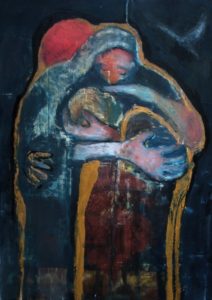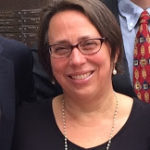John 13:35
“By this all will know that you are my disciples. If you have love for one another.”

We humans are pretty darn good at making other people miserable. We scapegoat. We refuse to welcome the stranger for fear of losing our position in the order of things. We exclude, leave others out, and we refuse to accept our own privilege to the demise of others. When we feel harmed, we seek revenge in subtle and not so subtle ways. Our anger takes over, and we lash out. We hold others captive with our rage, disgust and/or our societal constructs that demean, and dehumanize. Sadly, these sins of ego cause lasting damage. Miroslav Volf writes that to deny the identity of another person is a form of violence. Reaching back to the New Testament metaphor of salvation as reconciliation, Volf proposes the idea of embrace as a theological response to the problem of exclusion.
I know a young man who as a child endured Sunday after Sunday of harsh judgment while attending church with his family. From 9am until 1pm, each Sunday, he heard the minister preach from the pulpit, against homosexuality. Realizing at the age of 12, that he was attracted to boys, he grew frightened. What was this hell that his minister warned them about? Silently, he suffered. He detached emotionally, as a defense against his “badness.” There were no parents to reassure him, no Sunday school teacher to remind him of God’s love. Dissociation became his means of survival. A deeply thoughtful and wonderfully talented soul, he kept himself to himself through middle school and into high school. He made few friends, he felt little joy, he questioned every aspect of his being, internalizing a profound unworthiness. He did not go to prom, and when the time came, he did not feel excited to graduate from high school. The youth group at church brought him nothing but a strong sense of shame. Now, in his late twenties, he suffers from severe depression. Self-loathing runs deep. He questions his existence.
Many years ago, in the early 1990’s, I attended a March in Washington DC celebrating and affirming gay rights. The AIDS Memorial quilt was laid out on the Mall – so many deaths, over 150,000 at that time. As I marched with my husband and another friend, we came across a conservative church group positioned on risers refusing to make eye contact with the marchers. They all shared the same expression, looking straight ahead, their lips in a straight line. It was a distinct repudiation, and they were sure of their righteousness. I felt the exclusion deep within as I marched by them with my sign in hand, and I am straight. I will never forget that wall of human disapproval, the profound othering. And I knew that whatever it was that I witnessed that day, it was not of God. Such profound exclusion is damaging to the human soul. This hate filled othering creates mental health concerns that last a lifetime.
The young man I referred to previously, feared that when he came out to his parents that they would make him participate in conversion therapy. To his surprise, they fully accepted him as he was, and stopped attending their church. To tell another human being that they are not in God’s plan is deeply hurtful, and profoundly damaging, particularly when they seek to live out the will of God. For the young man, the voices deep within continue to challenge him, so intense and prolonged were the messages of badness. I am not sure if he will choose life, in the end. It should not be this way.
Perhaps all of us at one time or another have experienced scapegoating. I certainly remember some very lonely middle school years. Abandonment and rejection hurts, deeply. Particularly, when it feels like God abhors you. This perceived divine rejection permeates the membranes of the soul. When family and beloved others abandon and disown it is a death. Our histories circle around into adulthood. When a church conflict arose during a time when I was a congregational leader, my heart broke. The emails, the blame, the emptiness, the loss of friends, and the quiet turning away, left me raw. Make no mistake, this was and is a great church. But for me, sadly, the complexity of that time period triggered underlying depression and anxiety.
Everyone has the right to be seen. All people have dignity and worth. Our disdain for the other does more damage than we fully comprehend. “You will know I am Christian by my love, by my love.” In 2021, instead of othering and exclusion, let us find our humanity, and build a future rooted in God’s embrace.

Jennifer Stuart
Jennifer Stuart is an ordained minister in the United Church of Christ. She serves as a community minister at First Church in Cambridge, MA, UCC. Jennifer, a clinical social worker specializing in psychological trauma, is a psychotherapist at the Danielsen Institute at Boston University.